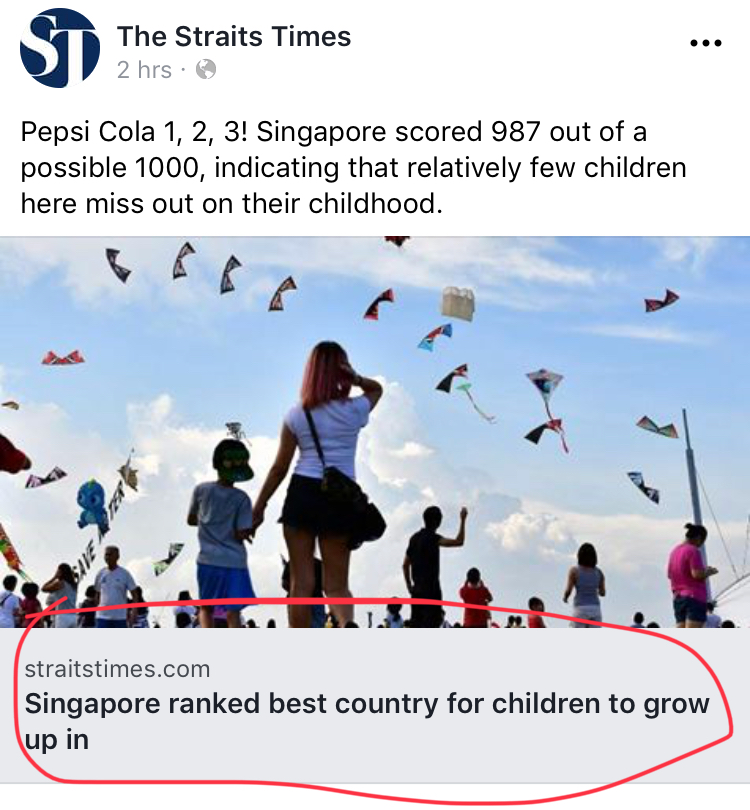You may have come across this Straits Times headline on Friday afternoon:
 Screenshot via Straits Times Facebook post
Screenshot via Straits Times Facebook post
Which, of course, triggered a flurry of comments such as the following:
 Screenshot via Straits Times Facebook post
Screenshot via Straits Times Facebook post
 Screenshot via Straits Times Facebook post
Screenshot via Straits Times Facebook post
This finding certainly may get one scratching one's head on initial reading — what about the cost of raising a child? Stress levels in school? Streaming? Complicated syllabi? PSLE? O Levels? A Levels?
But it's likely to be slightly less baffling upon closer reading of the study that yielded this finding — which, by the way, matches Singapore for Slovenia at the global top spot in terms of "doing better at protecting childhoods".
[related_story]
More pressing problems
Here's how it's explained by Save the Children, an American organisation that focuses on the welfare of children in the US, which ran this study and produced these rankings:
"The scores measure the extent to which children in each country experience “childhood enders” such as death, chronic malnutrition, being out of school and being forced into adult roles of work, marriage and motherhood."
In other words, in each country, how many of the children living there are forced by circumstance to "miss out" on their childhood?
Here are the factors the study looked at:
This is also likely to give you a much better idea of why Singapore ranked right on top —
1) A country's under-5 (years old) mortality rate — deaths per 1,000 live births
For Singapore, this number is 2.8. Slovenia's is lower, at 2.3, but the number, depending on which of the 175 countries you're looking at, can go as high as 132 in Somalia, and 113.5 in Sierra Leone.
2) The percentage of children who face stunted growth (due to malnourishment) aged between zero and 59 months of age
For Singapore and Slovenia, the list in the report indicates data is unavailable or pre-dates 2005. The countries that show the highest figures for this statistic are Timor-Leste (50.2 per cent face stunted growth) and Papua New Guinea (49.5 per cent).
3) The percentage of children (primary and secondary school age) who are out of school
This figure is 0.1 per cent for Singapore, and 2.1 per cent for Slovenia (honorable mentions go to the UK [0.6 per cent], Sweden [0.8 per cent] and Spain [1.1 per cent]. But yes, this can go as high as 66.7 per cent in South Sudan and 59.9 in Eritrea.
4) The percentage of people (aged between 5 and 17) engaged in child labour
For Singapore and Slovenia, the report lacks data for this statistic. The countries with the highest figure for this statistic include Mali at 55.8 per cent, and Benin at 52.5 per cent.
5) The percentage of girls (aged between 15 and 19) who are married or in a union
Singapore's statistic of 0.4 per cent was the most recent available, according to the report, during the period of 2005 - 2011, and does not include consensual unions. Slovenia clocked in a close second at 0.5 per cent, while Norway trounces us both at 0.1 per cent. For cultural reasons, possibly, though, the countries with the highest figures for this stat are Niger (59.8 per cent), the Central African Republic (54.9 per cent) and Bangladesh (44.2 per cent).
6) The number of births per 1,000 girls aged 15-19
In Singapore, this figure is 3.8. But it can go up as high as 201.2 in Niger, 173.7 in Mali and 161.9 in Angola.
7) The percentage of a country's population that is displaced by conflict
Singapore, quite needless to say, scores 0.0 on this, as do many other countries actually. But it's serious business in Syria (68.2 per cent), where there is also recorded evidence of children being recruited in the use of extreme violence, for instance as soldiers, and in South Sudan (31.1 per cent)
And finally,
8) A country's child homicide rate (number of deaths per 100,000 people aged zero to 19)
Interestingly, a number of other countries score lower than Singapore (0.9) on this indicator. But the figure goes as high as 28.9 in Honduras, 26.9 in Venezuela, 22.1 in Colombia.
Guess the things we worry about all the time about raising children in Singapore aren't quite so bad after looking at these indicators, eh?
Top photo via Getty Images
If you like what you read, follow us on Facebook, Instagram, Twitter and Telegram to get the latest updates.
